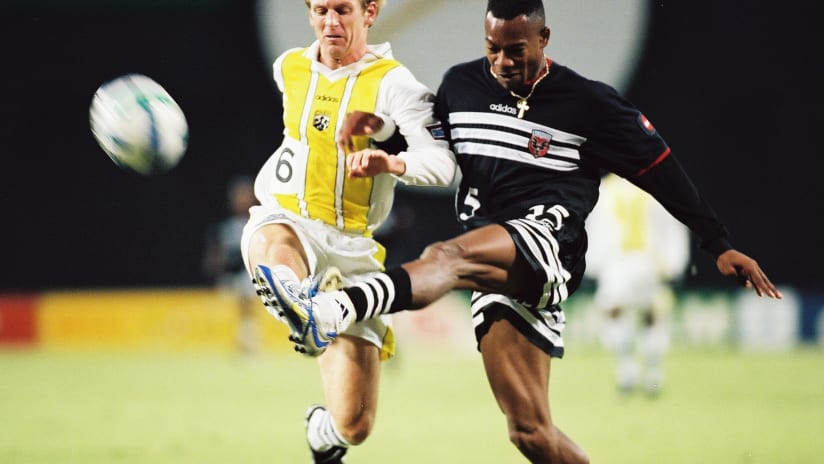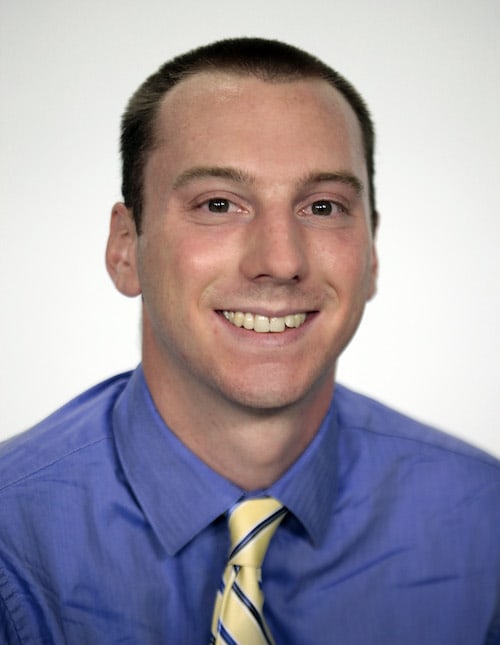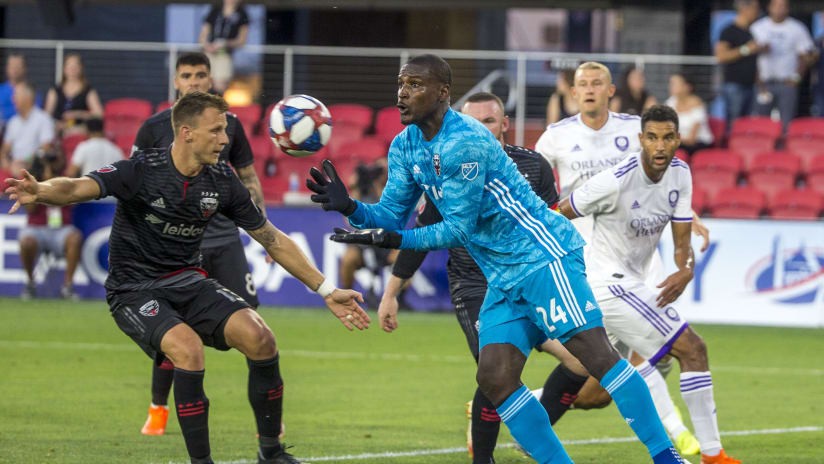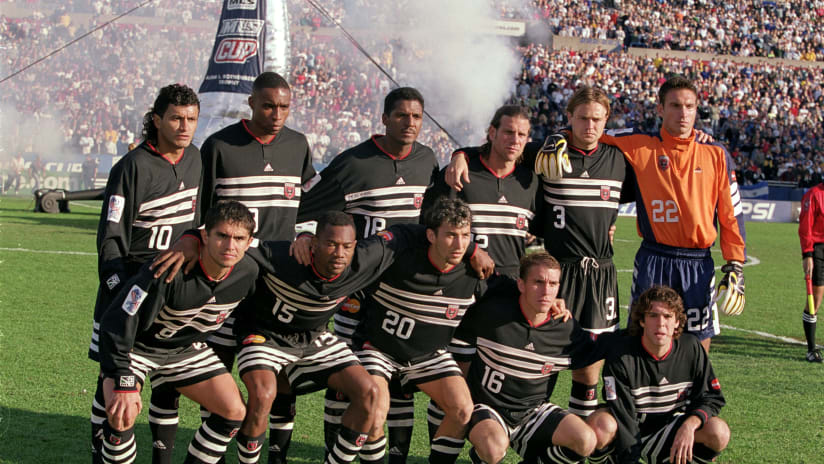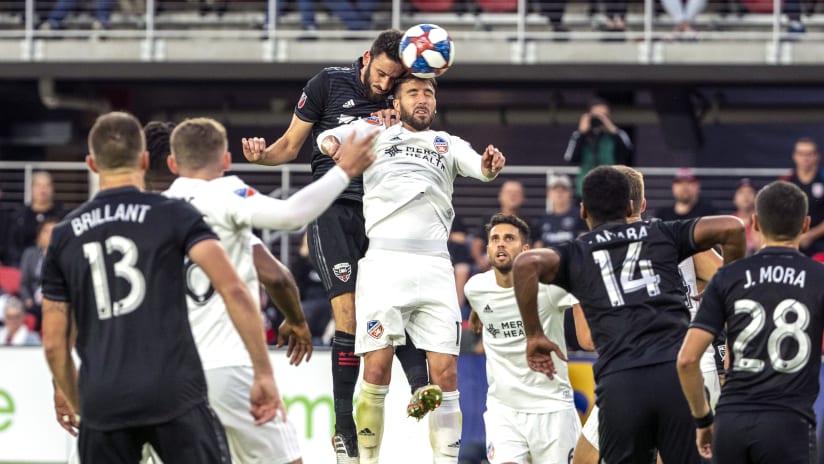Twenty years ago, on Nov. 21, 1999, D.C. United captured its third MLS Cup in four seasons to cement its legacy as the first true dynasty in league history, a claim that would be strengthened when the Black-and-Red captured another title five years later. And on that balmy November afternoon at Foxboro Stadium, before a raucous crowd of nearly 45,000 fans, United bested the LA Galaxy in a 2-0 victory that served as the capstone for a remarkable campaign.
That season, under the direction of first-year coach Thomas Rongen, United posted the best record in MLS (23-9), scored the most goals in MLS (65) and finished with the best defensive performance in franchise history (43 goals conceded). Defender Jeff Agoos, midfielder Marco Etcheverry and forward Jaime Moreno were all named to the MLS Best XI, tied with the Galaxy for the most players from a single team.
Over the next few weeks, we will recreate the ’99 season through the memories of those who lived it: the players, coaches and staff members who exorcised their demons from a crushing defeat in the 1998 MLS Cup to hoist a trophy and parade it through the streets of Washington D.C., rewarding those faithful fans who had stuffed RFK Stadium to its capacity all year.
Our first viewpoint comes from striker Roy Lassiter, who tallied 18 goals and 11 assists while leading the line for United that season. It was his second year with the club after returning to MLS following a brief loan in Italy, and Lassiter carried the confidence and flair every talisman needs. He debuted with 18 goals for the Black-and-Red in ’98 and then matched that feat during the title-winning campaign.
iTunes | Spotify | Stitcher | Google Play | SoundCloud
Q: Most people know how the ’99 season ended and the ultimate success you had winning MLS Cup and the Supporters’ Shield, but at the very beginning of the year, when you guys reported to camp, did you know that this was a special bunch already?
A: Absolutely. I mean, our main goal was to get back to (MLS Cup) and when we get back, we’re going to win the whole thing. And that’s why we started on a tear like we did. We just had that all in mind. I think we even started the preseason early. I think that was already in mind. I think we were already there, and we just had to go through it. But our mindset as soon as the MLS Cup in ’98 was over, ’99 we weren’t going to let slip away.
Was it unusual to be such a talented team while also going through a coaching change from Bruce Arena (1996-98) to Thomas Rongen (1999-2001)? Because usually teams that go through coaching changes haven’t performed well the prior year, and obviously that wasn’t the case with United.
Yeah because although Thomas Rongen was different than Bruce, Thomas didn’t reinvent the wheel, you know? He kind of kept it nearly the same — nearly. Obviously they have their details that are a little bit different and their personalities and little small things they like to do different, but no, I think Thomas Rongen came in already knowing the team, keeping it like it’s going. I think he was kind of on the same page as the players. He respected tremendously the players a lot. A lot. So he kind of let us do our thing. Training was fun, just like with Bruce. It was fun. It was competitive. And good players like competitiveness. That’s fun for us, you know? I think that’s why the success happened the way it did in ’99.
Other teammates remembered certain training sessions when they would get done with a two-hour practice and think it was actually more difficult than a game. Does that speak to A) the level of talent that you guys had and also B) just how feisty it was every day in practice?
Every day was feisty. Every day was a battle. Every day was, ‘I want to win.’ Every day was like that. Every day was a challenge. Every day was a competition. Every day was like that. So yeah, we got in the games and shoot, man, we had already battled for five days during the week. The games came and we were like, ‘Hey, this is what we do all the time.’ So yeah.
And the talent level was high. We had very, very talented players on the team. I really thought our ’98 (team) was it. I really thought it was it. I was like, ‘We’re going to win this.’ And we probably should have. I think during the course of that ’98 championship game (a 2-0 loss to the Chicago Fire) we let things slip away. We didn’t take care of our opportunities, including me, but I was thinking we were going to win that championship.
So when you enter the ’99 season and you start as hotly as you guys did — and even you in particular had three goals in the first four games — did it start to feel like this was a bunch that unless you made it to MLS Cup, something went wrong?
Yeah, yeah. No doubt. There was no cruising, for sure, because every team came at us. Yes, we were the team to beat. If you were on D.C. United’s team, you felt like you were, you know, you were on the best team in the league, which we were. And everybody wanted to be a part of D.C. United and every player thought it was a privilege to be on D.C. United’s team. So again, we’re thinking that we’re going to take the season — just like that. We were going to take it.
As a guy who made a living putting the ball in the back of the net (18 goals in ’99), how fun was it to play with teammates like Jaime Moreno (13 assists) and Marco Etcheverry (17 assists) and Ben Olsen (11 assists) who could give you the type of service that they did?
Oh, it was great. It was great. They were very good. My job was just to get open, get in those spots and put the ball in the back of the net, and that’s what I did the best. I didn’t try to come back in the midfield all that much and dribble (past) guys — no. We had plenty of guys that could do that. I was just focusing on my role in putting the ball in the net because I loved doing it. I loved doing it all costs. I loved doing it. And I was pretty good at it so I just kept on doing it. I just wanted to do my role and I think the rest of the players could do theirs. And again, we had exceptional players.
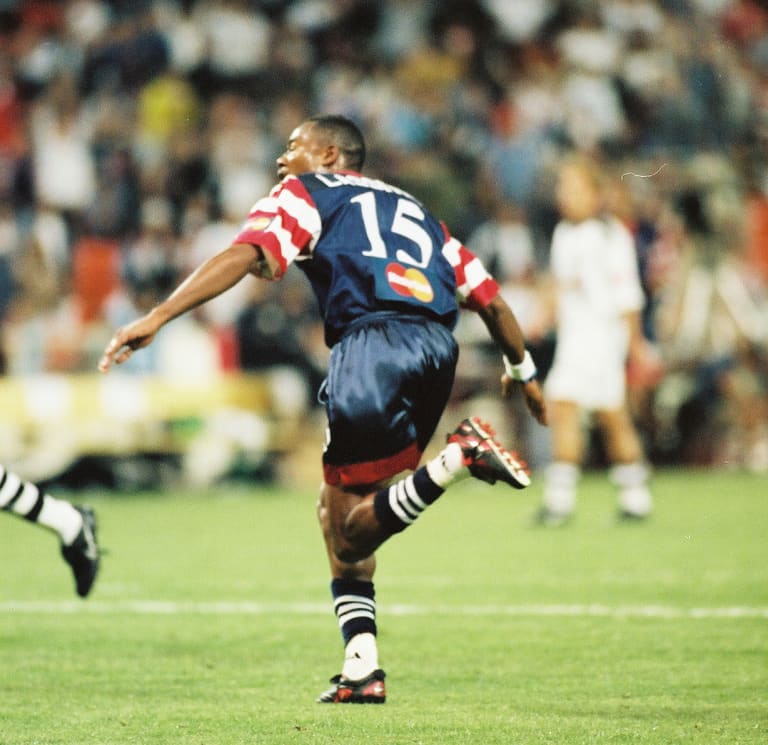
So you started the season with 11 wins in the first 14 games and then you dropped a little bit in June and July. But then August and September you win 11 in a row. Did it feel like you were starting to peak at the right time?
To tell you the truth, I don’t remember (the win streak) so vividly. But I can remember we had high spurts and I do remember we dipped maybe a little bit. But after that, I think we just got rolling. And I think once we got rolling again, I think at that point we knew we were bound to get to the finals. And our main goal — because the goal was written — is that we’re going back to MLS Cup to win a championship. That was our main goal was to win a championship. So we had to take it little by little, had to come back a little bit, step back and then try to go for what our goals were.
What do you remember about the crowds at RFK Stadium and the support you had in the city at that time?
Oh, those were great, man. We probably had the best crowds in all of Major League Soccer. I mean the chants and everything about it was just super good. It was just super good. It was so great to play at RFK. It was so good. I felt at home all the time. I felt like I was going to score all the time at RFK. It wasn’t the absolute best stadium but it was our stadium.
Some of your teammates said RFK had an aura that when you walked in, you knew it was a tough environment and also had this smell that you couldn’t forget, a smell that was only associated with RFK. They remembered the blackouts by fans and things like that. Did you get the sense that for opposing teams, it was just a place you don’t really want to go?
Oh absolutely, absolutely, absolutely. I think teams walked in there saying, ‘Hmm, this is going to be a hard game. Let’s try to get away with a point if we can. Let’s steal a point.’ I don’t think they really went in there — besides maybe (the) LA Galaxy — trying to take all 3 (points). They had a sense that they could maybe win the game, but I think the rest (of the teams) were like, ‘Let’s just get a point if we can, or let’s not get scored on as much as we can,’ knowing that if we got rolling, it was really over.
As a team, you finished the season with the most goals in MLS and the team that was in second, the Dallas Burn, had 11 fewer than you did. What was it about the D.C. United attack that made it so potent?
Well I think we had players on all levels that were very, very good. And we really had a solid defense. Without the solid defense that we had — and I think everybody was working — we wouldn’t have been able to obtain the ball enough to have consistent opportunities, you know?
And we had guys that were good on the ball. If you lose the ball a lot, then you’re probably not going to score as much because you’re going to have the ball less than half the time. So we really had possession. And if you have possession of the ball a lot, then that will help you create more opportunities to score, and that’s what we had.
When you look at the playoff run, you win the first-round matchup with the Miami Fusion pretty comfortably in two games. Then you go to the Columbus Crew and there’s a little bit of adversity because you win Game 1, but then you kind of get pummeled in Game 2 by a score of 5-1, and all of a sudden it’s do or die in the Eastern Conference Finals. Was there ever any thought that the season might be teetering?
As I recall, we kind of had to get ourselves together a little bit, you know? We did. But we also always knew that we were going to play back home, and home is where we are going to get the win for sure. Columbus is always tough where they played. I just knew going back to RFK we were going to get the win.
In Game 3, you guys received a goal and three assists from Echeverry, two goals from you, a goal and an assist from Moreno and then somehow, your goalkeeper, Tom Presthus, assists your first goal in the 34th minute. I don’t know if you remember that.
Yeah, yeah, I do. I definitely do. It was a goal kick. I just knew — and I think we knew — we messed up that game (in Columbus) and I think it really pissed us off. I think that pissed us off more than anything. It’s going to be a different circumstance coming back to RFK, it’s going to be a different feel.
We kind of knew when we came back to RFK that we were going to take care of business. Now, I wouldn’t lie to you: I don’t think I had any sense that we were going to lose the game. But I knew we needed to come out swinging. It was going to be a dog fight. We were just going to come out swinging. That was really just our feeling.
You’ve probably been asked about it dozens of times before, but can you walk me through the bicycle kick goal in Game 3 against Columbus?
Yeah. I think it was a pass from Marco, then it hit Jaime, and Jaime headed it inside the box. I was going inside the box. I turned my body and I’m instinctual. I’m instinctual. I’m not thinking about how I’m going to do it or anything like that. A forward is instinctual. His instinct is like, ‘If I see it, I’m going to do it. I’m not going to think about anything else.’ And that’s what I did. I just saw it, turned, spiked it and it went in the back of the net. That’s it.
Does that still stand out as one of the more fun goals in your career?
Sure, sure, sure. Most fun, most difficult, most incredible too because I didn’t really know it was going to go in the back of the net. I’m just going to get on it, you know? I’m going to turn, I’m going to be creative and I’m going to get on it. I thought I could do anything, anytime in the box. I just thought that I could do anything at any time.
Between that third game against Columbus and MLS Cup there were eight days of calendar time. Do you remember what the buildup was like? Were there any nerves that crept in because you were on the verge of achieving the goal that you had set so many months earlier?
I just think it was exciting. I can just remember every day was exciting, and the days went by super, super fast, you know? It went by super fast. The day got there and it was a great moment. I don’t think we liked Boston too much, playing there, I think there could have been better sites to play, better fields to play at that time, better weather conditions at that time. I just think it could have been somewhere else better.
What did you think of the Galaxy as an opponent?
Good team. Good team. Anything could happen. They were very good. They were really good, and it was always a match. It was always a battle. During the season it was a battle. That was the rival thing in the league: The LA Galaxy and D.C. United were the rival teams of the league, you know? It was a rival championship. Two good, very good teams.
But I still think we were just offensively very, very good. I just didn’t think they had enough to keep us (out of the net). They had good pieces, and I remember that. They could break us down if they were in their best moment. They could break us down and they could handle us. But if we got going as a group, it was over. And I think Thomas Rongen’s first thing was we’re going to get all over them from minute one.
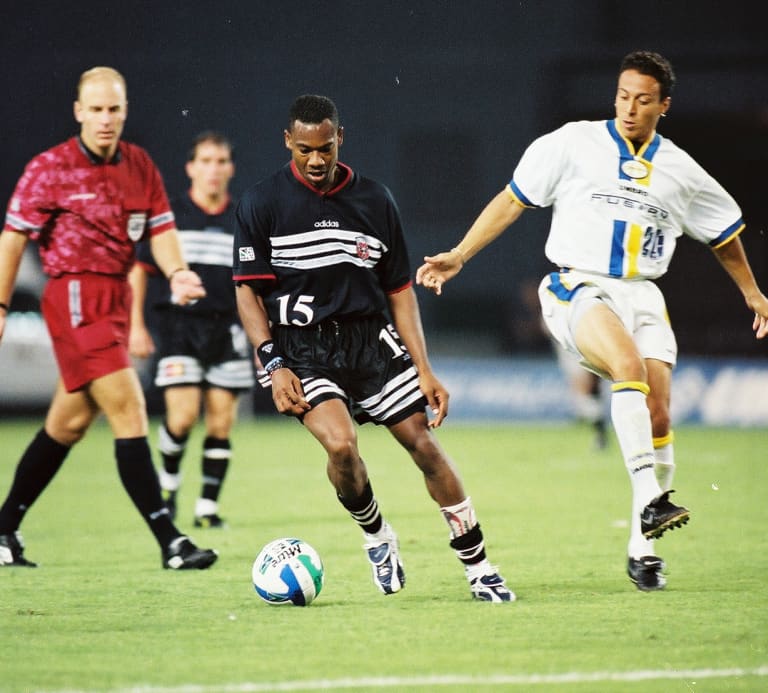
Sure enough, it took fewer than 20 minutes to get the first goal. I’m sure you would have liked to pop it in there yourself, but Jaime pokes in your rebound and the team goes crazy. You sprint behind the goal, jump over the advertising boards and start celebrating with the United supporters behind the goal. What did that moment feel like? And when you think back on it now, what are your memories of it?
It was a moment where I felt if we got the first goal — and I’m thinking that I’m going to get the first goal — the game was over. We’re going to finish this game. And I wasn’t going out of there without winning. That was my whole thing the whole time: I’m not leaving this place without this trophy.
Then at that point, once we were playing, I didn’t care who scored the darn goal. And I had a moment to score. I had a moment to score in that game and I probably should have scored in that game. But at that point, I didn’t care. I just wanted to win. I just wanted to win. But I think we were super confident in our celebration, our animosity, our passion was just really showing. Our excitement was really showing. And then I think we started to pour it on even more after that.
And then toward the end of the half, the Galaxy have that goalkeeping mistake and Ben Olsen pops it in from 25 or 30 yards out. So right before halftime it’s another gut punch for them. You go into the locker room at 2-0 up, and camera crews in the Galaxy locker room have clips of Cobi Jones swearing and screaming. Did it feel like you had the game in control?
Had it in control, but the game wasn’t over. We knew that. Yeah, we knew that for a fact. We knew LA wasn’t going to lay down at all. And we knew they were going to come out and they were going to come out strong. And they probably did. But no, we didn’t think it was over.
When the final whistle sounds and a goal you had set during the very first training session actually comes to fruition, what did that feel like?
Oh man, it was a really, really good feeling, man, because I think that was the one thing I hadn’t gotten was an MLS Cup. So I finally got that because I was so pissed off from the previous year that we should have gotten that one. I think I was just mad the whole year. I was really upset the whole year.
Now I’ll tell you, I know we’re talking about the ’99 season and I know we’re talking about D.C. United, but personally, halfway through the season I was already at (14) goals if I can remember well, if I can go back to that time. Halfway through the season I think I was at (14) goals, and this was at the All-Star break (on July 17, 1999). But then I kept hearing little trade rumors and I didn’t understand that. So I went to Thomas and I said, ‘OK, so what’s going on here?’ He said, ‘Oh, nothing, those are just rumors,’ and stuff like that.
But I just kept hearing those and I needed confirmation, affirmation, I needed all of that from D.C. United because, you know, I’m a guy that’s scoring 18 goals a year with the team. And last time I checked, that’s a guy you don’t get rid of unless you’re about to make $1 million off of him or something. You don’t want to get rid of that guy.
But I just kept hearing it. So from the All-Star break to the end of the season, (I only scored four) goals. That kind of bothered me the rest of the year. I should have broke my own record in 1999. I should have broke my own record and the pace that I was going and how many goals that I was scoring, by the halfway point, by the All-Star break, I should have rolled on and probably scored 15 more goals.
So in some ways, then, it sounds like you achieved the one goal of winning MLS Cup, but was there a part of you that still felt bitter about not scoring more?
Yeah, yeah, oh yeah. Oh my god, I was so — I was nearly chasing my own record at that time, you know? I was on par, too, and I could feel that. I could feel that. I just could feel that I was on pace with breaking what I had already done at the beginning of Major League Soccer. So that was a bitter thing for me.
Twenty years later, when you think back on it now, is there still bitterness?
I’m a team player. And I was always a team player. When I scored my goals, I played my part. I didn’t try to be the creative midfielder and (vacate) the box when a ball is streaking across and I’m halfway up the field because I’m trying to get on the ball in the middle of the field. No. I played my role. I did that.
Looking back on it, I’m grateful and I’m very excited and thankful that I got to win a Major League Soccer championship because that’s not an every-year thing for people and players, and it’s an achievement. But at the same time, I knew if I didn’t have those rumors going on, if I didn’t have that feeling going on, I would have done even better as an individual.
Up next: Jeff Agoos

